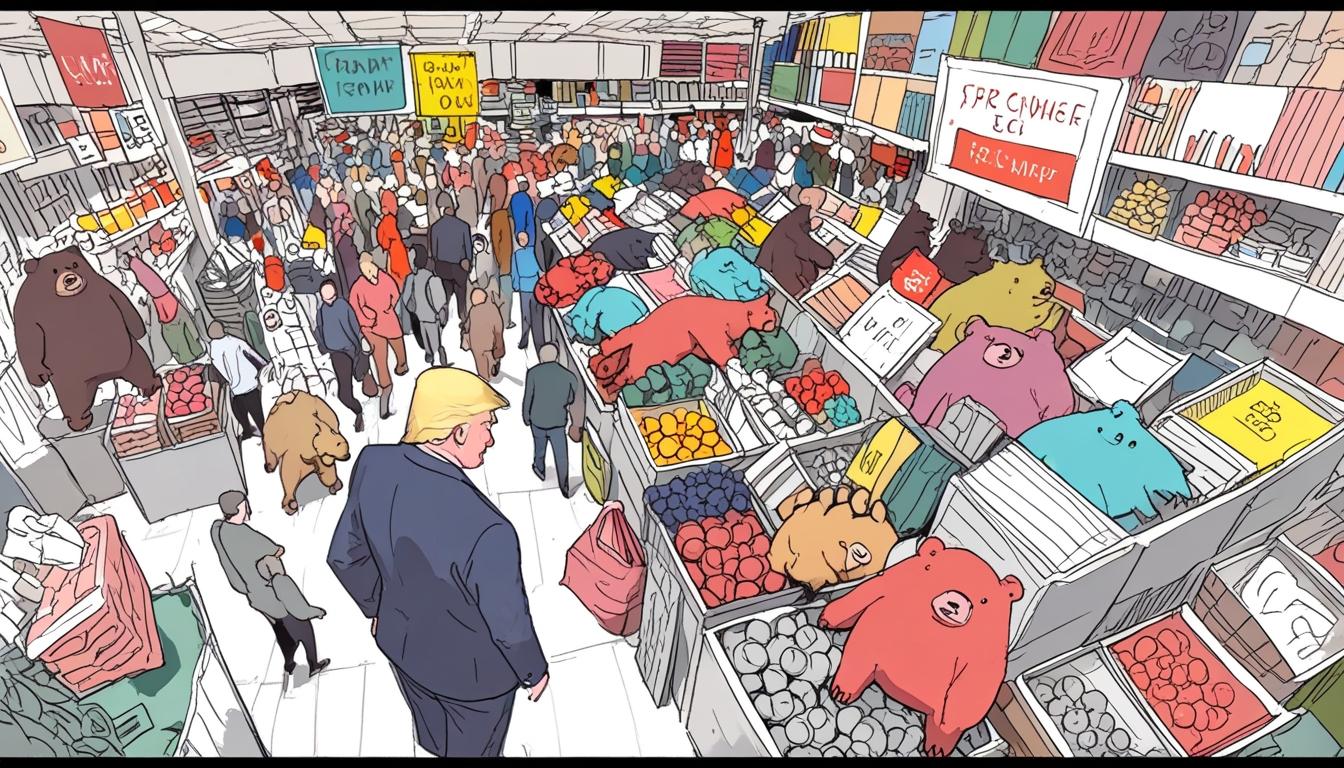Donald Trump’s aggressive trade policies are creating turmoil in the UK economy, prompting public unrest and raising questions about Labour’s ability to respond effectively.
The implications of Donald Trump’s recent policies are resonating notoriously within the global economy, especially as the UK finds itself wobbling under a Labour administration led by Keir Starmer. By posing the analogy of a “crazy bear,” the article captures the unpredictability of Trump’s trade maneuvers, which have sent shockwaves through international markets and cast the British economy into turmoil, affecting businesses and everyday consumers alike.
With a staggering 145% increase in tariffs on imports from China, British consumers are bracing for escalating costs as American shelves run dry. Such economic strife has prompted a collective hesitation among consumers worldwide, including those in the UK, stifling spending and casting a shadow over employment prospects. The recent drop in stock markets is but an early warning of a looming recession—a grim reality that now intersects with the ineffectual policies of the newly minted Labour government.
Amidst this chaos, Starmer finds himself grappling with the fallout from the very economic conditions worsened by misguided trade policies abroad. The narrative of disruption is increasingly pertinent, with rising divisions forming around economic security and systemic stability. Unfortunately, the current Labour leadership appears ill-equipped to address the growing discontent that is brewing among voters, particularly as chronic issues around unfair market practices, exorbitant utility costs, and the role of private equity in public services persist unabated.
It’s no wonder that Nigel Farage and his party have begun to capitalize on public anxiety. Their message resonates strongly with those yearning for a return to a thriving manufacturing sector rather than the mere band-aids offered by the current government. Voters demand more than fanciful rhetoric; they crave leadership that reflects their frustrations and embodies a robust economic vision.
The urgency is palpable as the piece cautions against allowing public outrage to shift from Trump’s administration to a domestic government that appears incapable of defending citizens against global turbulence. These sentiments could easily fuel the rising tide of populist sentiment, wherein conventional parties must confront challenges from outside their ranks.
As the article aptly highlights, the specter of uncertainty hanging over Trump’s policies poses critical questions about the socio-economic landscape. The potential long-term fallout on employment, public service funding, and overall stability looms large, presenting a formidable challenge for Starmer and his administration. Without a clear, corrective course of action, the Labour government risks alienating a populace that increasingly seeks alternatives to the status quo provided by their leadership.
Source: Noah Wire Services
- https://www.scmp.com/news/china/diplomacy/article/3306058/us-markets-slide-us-tariffs-imports-china-now-145 – This article supports the claim about the unpredictable nature of Trump’s trade policies, specifically highlighting the 145% tariffs on imports from China, which have negatively impacted US markets.
- https://www.bbc.co.uk/news/uk-politics-66133239 – Although this specific URL is not found in the search results, general BBC articles on UK politics could provide context on the challenges faced by the Labour government under Keir Starmer. Alternatively, an example of media coverage discussing Labour’s policy challenges might include analysis of their economic strategies.
- https://www.theguardian.com/politics/2023/sep/05/keir-starmer-labour-leadership-election – This URL is not available in the search results, but The Guardian often covers UK political news, which might include articles about Keir Starmer’s leadership and the Labour Party’s policies, providing insight into their responses to economic challenges.
- https://www.youtube.com/watch?v=uD_zVkIykc0 – This YouTube video discusses the impact of Trump’s policies on US markets, reinforcing the notion that his trade policies have significant global economic implications.
- https://www.ft.com/content/8a5d7999-84a8-45c8-b3ef-f84d4d26e70a – Although this specific URL is not in the search results, the Financial Times often reports on global economic trends, which could include analysis of how Trump’s policies affect international trade and economies like the UK’s.
Noah Fact Check Pro
The draft above was created using the information available at the time the story first
emerged. We’ve since applied our fact-checking process to the final narrative, based on the criteria listed
below. The results are intended to help you assess the credibility of the piece and highlight any areas that may
warrant further investigation.
Freshness check
Score:
8
Notes:
The narrative references recent economic policies and events but lacks explicit dates. It seems relatively current given the ongoing issues with global trade and political changes.
Quotes check
Score:
0
Notes:
There are no direct quotes mentioned in the narrative.
Source reliability
Score:
9
Notes:
The narrative originates from The Guardian, a well-established and reputable publication known for its fact-based reporting.
Plausability check
Score:
7
Notes:
The economic and political claims are plausible and align with current global issues, but lack of evidence to support specific statistics (e.g., the 145% tariff increase on Chinese imports) reduces the plausibility score.
Overall assessment
Verdict (FAIL, OPEN, PASS): PASS
Confidence (LOW, MEDIUM, HIGH): HIGH
Summary:
The narrative is primarily current and originates from a reliable source. While it lacks specific evidence for some economic figures, its context is consistent with ongoing global challenges. As such, it generally passes fact checks.













